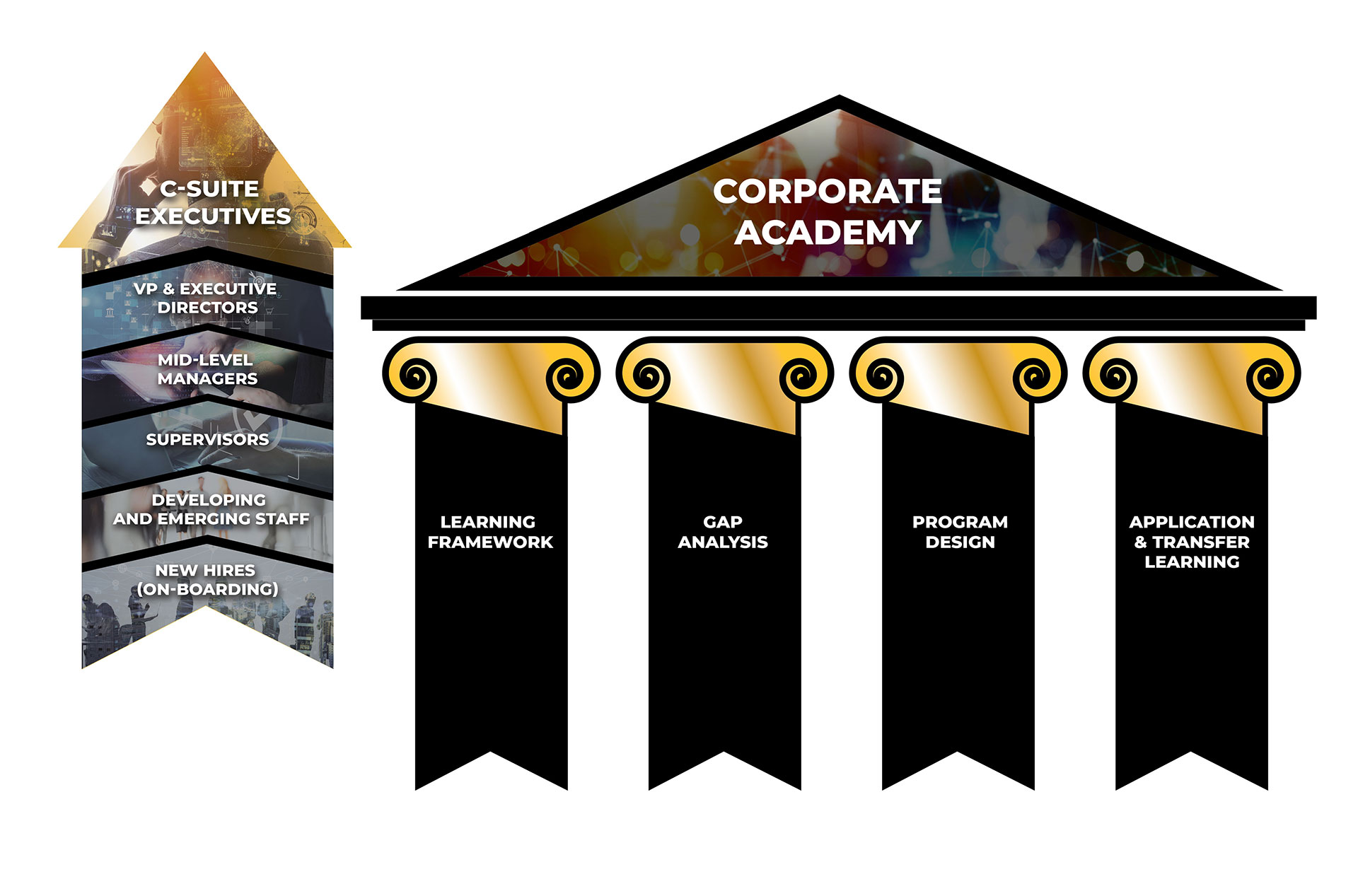
What is a Corporate Academy?
A Corporate Academy serves a strategic function by integrating employee development as individuals, teams, and eventually as the developer of the entire organization.
Corporate academies drive the educational goals of organizations that want to enhance their learning culture. The idea is to have a classroom or virtual platform that serves as the organization’s specific and recognized training base to align employees with the organization’s business objectives.
Advantages of Corporate Academies
- Lowers the cost of training — the development of individual employees becomes more cost-effective.
- Critical to the company’s growth —employers recognize the importance of communicating their company’s vision and strategic goals to their employees
- Creation of practical learning methods —customized learning materials and more company-specific case studies
- Employer branding — employees benefit from the added value of university-issued stackable credentials
- Employees gain experience — employees acquire and share knowledge with colleagues from all parts of your organization
The Process
Kennesaw State University can partner with your Human Resources executives to serve as your corporate learning partner by providing courses and programs that meet the strategic learning objectives of your organization.
Learning Framework
- Organizational Strategic Goal Alignments
- Solutions-based Programs
- Learning Approaches
- Tools and Technology
Gap Analysis
- Needs Assessment and Analysis for Program Selection and Development
Program Design
- KSU Professional Development Selection
- Custom-Designed
- Executive Leadership Program Selection
- Application and Transfer Learning
Delivery Platform
- In-Class
- Online
- On-Site
- Program Evaluation
- Transfer and Application
An Abbreviated Certificate Program List
Packaged Professional Certificate Programs

Technology
- Applied Data Science using Python
- Applied Data Science using Rapid Miner
- Applied Statistics using R
- AutoCAD Certificates (Essentials, Intermediate, Advanced)
- Revit Architecture Certificates (Essentials, Intermediate)
- Cisco CCNA Certificate
- CompTIA (A+, Network+, Security+) Certificate
- Information Systems Security Professional Certificate
Custom-Design Professional Certificate Programs
Business Writing Certificate Program
The Business Writing and Communication certificate program is designed for professionals who are responsible for developing business communication, whether that communication is within an organization or with customers. The program combines current theories of organizational communication and persuasion with the practices of business writing. Students will learn principles of effective communication while developing their own writing skills as they create persuasive and informational business documents.
- Learning Objectives:
- Mastering Writing for Internal Communication and External Communication (e.g., email, instructional, informational, persuasive, transactional)
- Developing Planning and Delivery Focused Writing Strategies
- Recognizing and Practicing the Do’s and Don’ts of Resume Writing
- Preparing for a Success Interview for advancement within the organization
- Using Language Effectively
- Progress Report Delivery

Virtual Facilitation and Presentation Skills Certificate Program

Learn to make virtual meetings engaging & productive. A complete toolkit from planning until post meeting communication. The Facilitating Virtual Meetings Training course is an interactive, instructor-led course that takes you through the initial starting point of planning your meeting, working through the key challenges of a virtual meeting and managing the technology by choosing your tools and understanding what to do when the technology fails. The Facilitating Virtual Meetings Training class, you will also learn to set expectations for prompt attendance, facilitate the discussion, ensure you hear from everyone, and bridge linguistics or cultural barriers.
- Learning Objectives:
- Understanding most effective speech and delivery methods for Teams virtual presentations
- Delivering a scope and purpose with confidence
- Overcoming presentation fears and nervousness
- Establishing credibility through voice control, eye contact, and physical presence
- Running productive meetings
- Designing and planning interactive meetings
- Gauging Progress (Progress report delivery)
Management Fundamentals Certificate Program
People are a company’s most important asset, yet they are also its most unpredictable and difficult to manage asset. And, regardless of the fact that effective people management is vital to any organization’s success, most managers do not receive the training they require to make solid managerial decisions. This course will introduce you to the fundamentals of managing people. The program will prepare you how to drive employee performance and develop reward system, how to design jobs and organize work for high performance, how to make excellent and timely management decisions, and how to design and change the structure of your organization. By the end of this course, you’ll have the knowledge you need to start motivating, organizing, and rewarding employees in your company so that both your business and your social systems may grow.
- Learning Objectives:
- Provide core management fundamentals curriculum for the management team at multiple levels of the organization.
- Focus on the details describing the role of the manager understanding the difference of managing, coaching and mentoring
- Conducting DISC assessments and review,
- Define and describe performance management
- Facilitate career opportunities discussions
- Goal setting
- Delivering feedback
- Conflict management and resolution

Soft Skills Communication Certificate

The Soft Skills Communication Certificate is intended to assist in developing in-demand professional abilities that will help you stand out as an effective communicator. This program examines modern business concepts and teaches participants how to create successful communication skills. You will develop and improve crucial hard and soft skills to help you stand out in using innovative methodologies for attaining organizational goals.
- Learning Objectives:
- Self-Assessment – Developing Your Strengths
- Communication Skills and Teamwork
- Problem Solving and Critical Thinking Skills
- Business and Data Analysis Skills
- Collaboration and Networking
Difficult Conversations about Diversity and Inclusion Certificate
- Learning Objectives:
- Navigate conflict approaches with different personality types.
- Learn the techniques to minimize defensiveness.
- Deliver effective feedback-including corrective feedback.
- Prepare to deliver delicate and sensitive feedback.
- Manage a behavior problem through feedback without destroying the relationship.

Using Data Analytics for Everyday Business Decisions Certificate

More complex business intelligence and data tools are employed to fulfill the requirement for comprehensive data collecting and manipulation as more organizations rely on data to drive corporate planning and decision-making. This program teaches you how to react swiftly to opportunities in the workplace and the marketplace. Managers and directors will learn how to use data insights, data management, and data science to assist actual workplace decision-making and planning.
- Learning Objectives:
- Analyze, arrange, and manage data to aid problem-solving, business decision-making, and the identification of opportunities.
- Create statistical and predictive models that leverage operational and marketing data to find patterns and deliver information to stakeholders in the organization.
- Evaluate and deploy business intelligence and Big Data tools appropriate for business choices, challenges, data flow, and system demands.
- Prepare and present complex content for various audiences, objectives, and degrees of detail verbally, in writing, and digitally.
- Evaluate and install business intelligence and Big Data solutions appropriate for your company’s needs, difficulties, data flow, and system demands.
- Prepare and present complicated content vocally, in writing, and digitally for various audiences, purposes, and levels of depth.
- Execute data-driven initiatives in accordance with data science, business analysis, and project management concepts, tools, and methodologies, ensuring that customers’ business objectives are met.
Conflict Management Skills Certificate
All staff must be able to manage conflict effectively. When used wisely, conflict may be a powerful tool for enhancing business culture and gaining a competitive advantage. This certificate will prepare you to identify problems in the workplace and negotiate difficult conversations with direct reports, colleagues, or bosses. You’ll learn how to assess, scope, and diagnose issues from all angles, as well as how to recognize distinct personality types and use a tried-and-true problem-solving technique to identify practical solutions that improve relationships and outcomes.
- Learning Objectives:
- Conflict Styles Assessment
- Diagnosing Workplace Conflict
- Applying a Problem-Solving Approach to Conflict Management
- Leading Challenging Conversations
- Mediation for Managers and Directors
- Cross-Cultural Communication
- Diversity, Equity and Inclusion Conversations
- Power Imbalances

Excel Functions for Data Analysis Certificate

The Excel Functions for Data Analysis Certificate is for those who have little or no functional knowledge of Excel and those who use Excel regularly and want to improve their skills. The application guides you through essential Excel functions such as reading data into Excel using multiple data formats, organizing and manipulating data, and advanced Excel functions. The course is intended for individuals who have little or no functional knowledge of Excel and regularly use it.
- Learning Objectives:
- Analyze in Excel from Power BI
- Power BI Helper and other tools
- Connect Excel to Power BI Models
- R & Python in Power BI
- Decomposition Tree and Key Influencers
Contact Us



